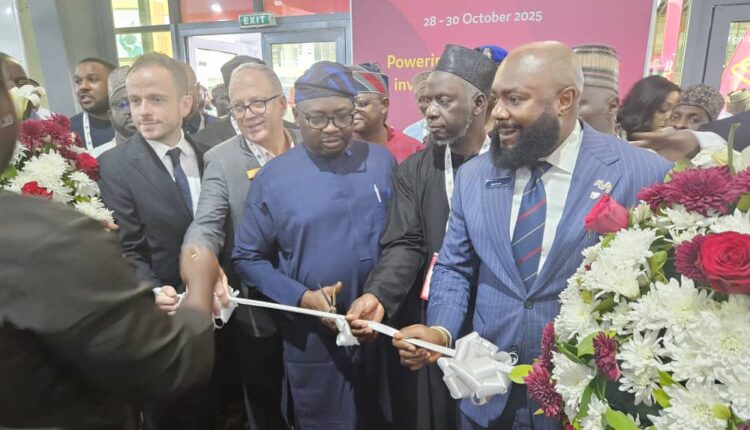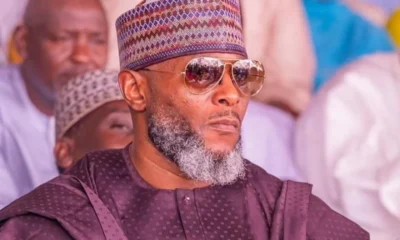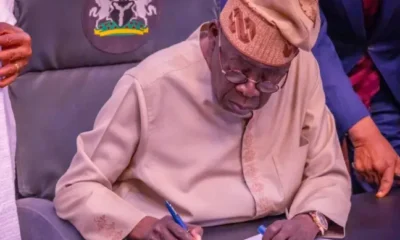Business
FG To Set Capital Threshold For DisCos’ License Renewal

With the new federal government reforms in the power sector, Distribution Companies (Discos) will be required to meet a minimum capital adequacy threshold to qualify for the renewal of their operating licence.
Speaking at the Nigeria Energy Forum themed, “Powering Nigeria through Investment, Innovation, and Partnership”, in Lagos on Tuesday, Minister of Power Adebayo Adelabu, who is silent on the amount, stated that the government is working to address the capitalisation challenges that have burdened many with debt.
To combat under-capitalisation, the government will introduce a minimum capital adequacy requirement for utilities as part of the license renewal process. This measure aims to strengthen their financial health and liquidity.
Nigerian Power Discos face liquidity issues stemming from inadequate grid supply, ageing infrastructure, underqualified staff, low metering, inaccurate customer data, lack of investment due to poor revenue, insufficient tariffs, and substantial ATC&C losses.
DisCos’ limited operational funds hinder infrastructure investment, network maintenance, and payments to GenCos, degrading electricity supply quality and reliability for consumers.
Beyond liquidity issues, the government observed DisCos’ reluctance to invest, impairing service quality and hindering adequate power supply.
“This is why we are going to focus on the DisCos this year and carry out a lot of restructuring, a lot of reforms in the DisCos. They are not ready to make more investments. And the balance sheet is not healthy enough to even attract debts from the finance sector,” the power minister said earlier.
Since assuming office in 2023, the power minister has implemented a comprehensive, multi-pronged reform agenda to reposition the Nigerian power sector for sustainability, efficiency, and growth. This agenda addresses structural challenges, unlocks private capital, and enhances service delivery across the electricity value chain through legislation, policy reforms, infrastructure development, energy transition and access expansion, and local content and capacity development.
The Minister cited the Electricity Act 2023, which has already enabled regulatory autonomy for 15 states, as a key achievement. He also announced the approval of the Integrated National Electricity Policy, the first comprehensive, sector-wide policy in almost two decades.
“This signifies a move towards a liberalized, investment-friendly electricity market. Following its enactment, 15 states gained regulatory autonomy to create subnational electricity markets, with one already operational. We are collaborating with these states to align wholesale and retail markets effectively. State government involvement, especially in the off-grid sector, is crucial, evidenced by the REA’s roundtable discussions with governors and ongoing monitoring of DisCo performance within their jurisdictions”.
On stabilisation of the market and sector commercialisation, he said the government is deepening power sector commercialisation to strengthen revenue, liquidity, and investor confidence. “ Through tariff policy reforms which enabled cost-reflective tariffs for select consumers, supply reliability has improved while reducing energy costs for industries, and industry revenue has increased by 70 per cent to ₦1.7 Trillion in 2024 compared to the previous year, and the revenue is expected to exceed ₦2 Trillion for 2025”.
To stabilise the market, he announced, “Mr President has approved a ₦4 trillion bond to clear verified GenCo and gas supply debts. Alongside this, a targeted subsidy framework is being developed to protect vulnerable households and ensure a sustainable path toward full commercialisation and viable industry”.
Adelabu provided updates on critical infrastructure projects. He confirmed that contracts for the Presidential Power Initiative (PPI) Phase One have been signed to add 7,000MW of operational capacity to the grid.
He also revealed that generation capacity has been sustained at an average of approximately 5,300MW in 2024, up from 4,200MW in 2023.
“In parallel to the grid expansion, generation capacity is being expanded through the rehabilitation of existing NIPP plants to unlock about 345MW, alongside the successful integration of the 700MW Zungeru Hydropower Plant into the grid. Collectively, these interventions have helped sustain an average generation capacity of approximately 5,300MW in 2024, up from 4,200MW recorded in 2023”.
The Minister disclosed further that the government has operationalised the Presidential Metering Initiative, with ₦700 billion already secured to deploy 1.1 million meters by the end of 2025.
He also noted that the unbundling of the Transmission Company of Nigeria (TCN) into two organisations: the Nigerian Independent System Operator (NISO), which manages the operation of Nigeria’s electricity grid and coordinates the electricity market, and the Transmission Service Provider (TSP), which owns, maintains, and expands the physical transmission infrastructure marks a long-awaited and critical structural reform in the power sector.
The Minister made a direct appeal for investment, emphasising that Nigeria’s power sector remains open and ready for business more than ever before. He pointed to the over 10 GW of stranded generation capacity as a critical opportunity, assuring stakeholders that market fundamentals are improving, the policy environment is clear, and the national leadership is committed.
“As we commence today’s forum, let me once again emphasise to our investors, financiers, and innovators that Nigeria’s power sector remains open and ready for business more than ever before. We recognise that achieving the scale of investment required to transform the sector requires greater private sector participation across the entire value chain, particularly in the transmission segment. A useful reference is South Africa’s ambitious $25 billion transmission grid expansion initiative, which seeks private developers to deliver 14,000 kilometres of new power lines and connect over 59 GW of new capacity within the next 14 years. This is remarkable when compared to Nigeria’s Presidential Power Initiative (the Siemens project), valued at $2.3 billion.
“In Nigeria today, we have over 10 GW of stranded generation capacity. Energy that could power industries, create jobs, and even support electricity exports to our neighbouring countries through the regional power pool. We are therefore open to strategic partnerships to mobilise the necessary investments and unlock this potential. Our market fundamentals are improving, our policy environment is clear, and the national leadership is committed to creating the enabling conditions for long-term investment and innovation”.
-

 News3 hours ago
News3 hours agoMajor, 3 Soldiers, Hunter Killed In Borno
-

 Politics3 hours ago
Politics3 hours agoAtiku’s son resigns from Fintiri’s cabinet
-

 News18 hours ago
News18 hours agoJustice Tsoho To Appear Before CCB Over Alleged Non-Declaration Of Assets
-

 News3 hours ago
News3 hours agoUmrah Suffers Setback As Airlines Suspend Flights To S/Arabia
-

 News3 hours ago
News3 hours agoRevised Executive Order: FG adjusts oil revenue remittance framework
-

 News3 hours ago
News3 hours agoPolice Council Confirms Disu As IG, To Be Sworn In Wednesday
-

 Politics3 hours ago
Politics3 hours agoDSS arrests social media user who ‘threatened’ Peter Obi after Edo attack
-

 Business3 hours ago
Business3 hours agoPrivate jet flight from Riyadh to Europe now cost N479m as elites flee Middle East tensions – Report


















